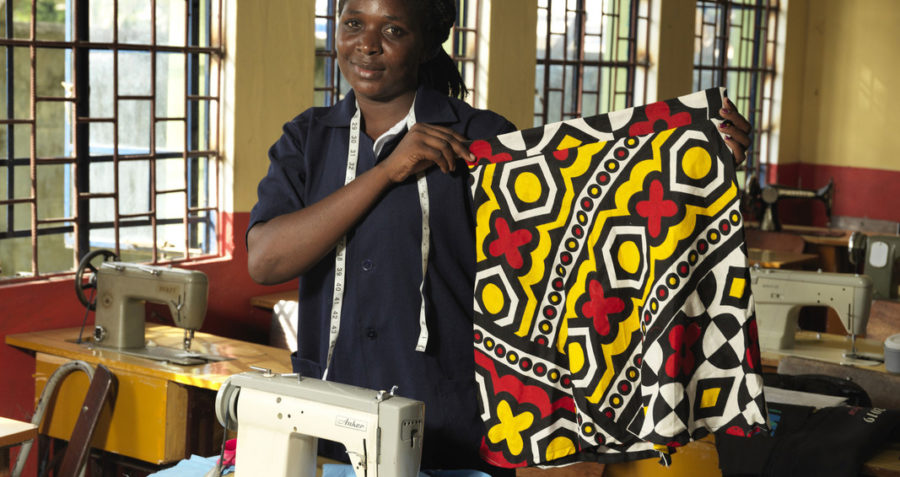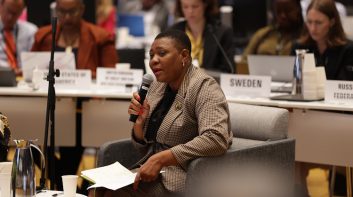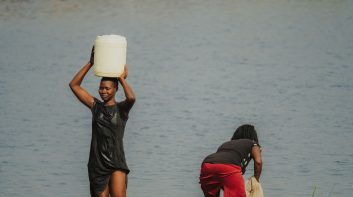Anabela’s story: opportunity knocks with Skills2Live in Mozambique
 Frontline AIDS/Peter Caton/2019
Frontline AIDS/Peter Caton/2019
How vocational training, entrepreneurship classes and life-skills sessions are improving vulnerable young people’s health and well-being
“I like to talk,” says Anabela Armando Tigueira, 24, from Beira in Mozambique. “I like to advise others, and ask others what I don’t know so I can learn more. I’m active and I don’t like being left with nothing to do.”
Anabela, who left school in the tenth grade, enrolled in our Skills2Live programme which provides vocational training alongside sessions on entrepreneurship, life-skills and sexual and reproductive health and rights for vulnerable adolescents and young people in Mozambique and Zimbabwe.
Skills2Live participants are young people who are struggling to find work, a situation that can affect their mental health and well-being and increase their vulnerability to HIV and poor sexual and reproductive health.
Seeking employment
Many participants have not completed school and do not have the qualifications or training to meet job requirements. Through Skills2Live Anabela is taking a sewing course and has her sights set on becoming a dressmaker.
“I had many challenges to try to find a job,” says Anabela. “I started to ask in each company if they had vacancies, including the shipyards among others.
“In my community there are also no job or vocational-training opportunities to help you have a skill, but I now have this opportunity through the Skills2Live programme.”
Building skills
The training courses run for three months and are taught by local business owners and entrepreneurs. Young people can train to be an electrician, a plumber, a mechanic, a refrigerator engineer, a cook or a tailor. No gender emphasis is placed on the courses on offer, enabling all participants to take the course they feel is of most interest and use to them.
After the course finishes, a three-month work placement is offered so students can put their newfound skills into practice and further increase their employability.
“I chose the cutting and sewing course because in my area there is a lack of dressmakers and tailors to repair clothes,” says Anabela, displaying a keen entrepreneurial streak. “I chose the course to reduce the problems of people who have to travel to the neighbourhood of Munhava for tailoring services.”
Improving sexual and reproductive health
Skills2Live trainings have Wellness Centres attached to them. These are youth-friendly, safe spaces staffed by health providers and community adolescent treatment supporters (CATS); young people living with HIV who are part of Frontline AIDS’ READY movement.
The CATS provide Skills2Live participants with information, support and counselling on sexual and reproductive health and rights, including HIV, and will also signpost and refer participants to other youth-friendly related services, support groups and health facilities. If a young person requests to test for HIV or another sexually transmitted infection (STI), for example, they will support them throughout the process.
These and related issues are also covered by life-skills sessions taught by course tutors. Subjects discussed include STIs, sexuality, relationships, pregnancy, family planning, condom use and HIV testing and treatment.
“The CATS are good people and they attend very well,” says Anabela. “They counselled me and showed me how to use condoms correctly.
“I learned various things about HIV and AIDS through the Skill2Live programme, about HIV prevention, infection and treatment. I learned in the sessions to have healthy food, not to drink alcohol and not to lose nights’ [sleeps].
“I now have openness to people and I can now talk to other people. I can sit with my friends and counsel on HIV, how they can prevent themselves from getting it and how to treat HIV.”
Adapting to COVID-19
The programme began in June 2019 and was due to run for 18 months. The COVID-19 lockdown resulted in the Skills2Live training and Wellness Centres temporarily closing, which means the end of the scheme may be delayed. Wellness Centre staff have continued to offer sessions on sexual and reproductive health and life-skills through phone calls, SMS and WhatsApp, but say it is difficult to reach all those enrolled as some do not have access to the internet or smartphones.
“This pandemic is affecting my training because it would have ended if not [for COVID-19],” says Anabela. “Although the course hadn’t finished I had met some tailors in my neighbourhood and started sharing my experiences with them. With COVID-19 I can’t go out to meet those people.”
Despite the setback Anabela is hopeful for the future and wants others to benefit from the opportunities Skills2Live has given her.
“Ten years from now I see myself as a millionaire,” she says. “If I had the chance to speak to the government my message would be to support those who are unable to study so they can be trained, and give work to young people.”
About our programme
Skills2Live is part of the READY movement. It is organised by Young Africa International, Young Africa Zimbabwe, Young Africa Mozambique, Frontline AIDS, IdeiaLab, and International Organization of Migration (IOM), with funding from the Embassy of the Kingdom of the Netherlands Mozambique.
Further Reading
Tags
Adolescents and young peopleCommunity Adolescent Treatment Supporters (CATS)COVID-19HIV preventionREADYSexual and reproductive health and rights (SRHR)




